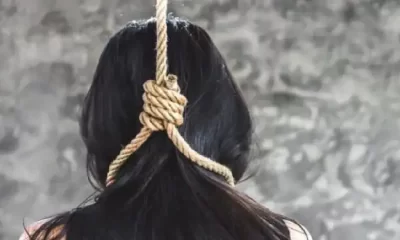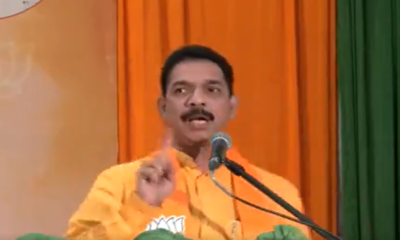[vc_row][vc_column][vc_column_text]Apex court also said that in case any criminality is found, the National Investigation Agency is free to investigate
The Supreme Court on Thursday, March 8, set aside the Kerala High Court order that annulled the marriage of adult Hadiya with another adult, Shafin Jehan, saying Hadiya was free to pursue her future endeavours in accordance with the law.
After this, Hadiya’s marriage to Shafin stands legally valid again.
In what became famous as the “love-jihad” case, on May 24, 2017, the Kerala High Court had nullified her marriage with Shafin Jehan, sent her to her parents’ custody and ordered a probe into it the so-called ‘love jihad’.
After hearings concluded on Thursday, the Supreme Court’s three-judge bench of Chief Justice Dipak Misra and Justices AM Khanwilkar and DY Chandrachud, in its order allowed appeal but set aside the order where marriage has been annulled while hearing a habeas corpus writ under 226.
The court, however, said that the National Investigation Agency (NIA) probe into alleged cases of Islamic conversion in Kerala by a “well-oiled network” would continue.
The case of the marriage of Hindu girl Hadia, original name Akhila, to a Muslim youth Shafin Jahan created ripples across judicial circles, especially after the Kerala High Court unilaterally annulled their marriage and sent Hadia back to her parents’ house. The issue of whether any court of law or any other third party can declare void a legal wedding of two consenting adults was a problematic issue that the Supreme Court took some time to resolve, because of the extenuating circumstances woven around it.
Hadia’s father Asokan has claimed that Jahan’s principal intention was to recruit his daughter to take her to Syria as a sex slave, or to join a jihadi movement. Even the NIA has become involved in this (the Supreme Court ordered it), having submitted a report on supposed “recruitments” by alleged ISIS recruiting agents. Jahan has been termed as one of them, say allegations. The court was to decide if this was a case of simple love-jihad or a case of planned human trafficking.
The Court had set up a committee to look into this with the help from NIA, but the head of that committee, retired Supreme Court judge, Justice RV Raveendran, in last August turned down the offer. Shafin had thereafter appealed the Kerala High Court verdict.
During the hearing on Thursday, senior advocate Kapil Sibal raised two preliminary objections. He said: “It was a regular habeas corpus writ. So how does the question of validity of marriage arise? How can the high court nullify the marriage?
“Secondly, no third party can move court in order to nullify a marriage which has taken place between two consenting adults,” he said.
Senior counsel Shyam Divan said: “In an appropriate case the high court may annul a marriage. It has the inherent jurisdiction.”
The CJI asked: “Can the court interfere with consensual obsession?”
Justice Chandrachud said: “We cannot completely rule out interference while nullifying the marriage. In exceptional cases the court can. For example, when a 16-year-old girl marries an 80-year-old man because she is poverty stricken or is being coerced. The court can then interfere whether the girl challenges such a marriage or not. This is an extraordinary situation, where trafficking is taking place.”
The CJI asked: “Can you nullify marriage under 226? I have never come across such a situation. We cannot go into the neurological aspect of consent by an adult of sound mind.”
Then the CJI told Additional Solicitor general Maninder Singh: “You can proceed with your investigation without touching the aspect of marriage. If marriage is a disguise to commit a crime, you can hold the person and proceed with the investigation. But whether the marriage is a disguise or not is a separate issue.”
Justice Chandrachud said: “Hypothetically, if the girl wasn’t married, can the court compel the girl to return to her father? No. While hearing a habeas corpus writ under 226, the aspect of marriage won’t have any significance.”
The ASG said: “If a marriage is free and valid, the state or the court has no role. But if prima facie investigation reveals otherwise, in that case what should be the status and role your lordships may decide. I’m not making any submission on that regard. Your lordships can guide us in this case and in future ones.”
Sibal said that the Kerala High Court report came after the order that no offence is made out. These are not scheduled offences.
Divan said: “It is a marriage fraud, therefore it is within the state interest to protect the victim. There was fraud within the marriage, therefore the sanctity of marriage can be invoked in this case?”
The court said: “We are not concerned with the offences here.”
The ASG said: “This is not the case of a love-marriage, but marriage on the basis of an online portal. Under section 153 A, 295A, 107 of the IPC and 57 of the Kerala Police Act an FIR had been registered. She did not mention about her marriage earlier on Facebook, although she is very expressive about her personal life there.”
Divan also mentions other cases where similar modus operandi have been used, saying that this was an organizational racket. “Conversation was there, in which she expressed her desire to go to Syria and her husband wanted to send her to Yemen. The high court noticed that a pattern was taking place where young women were being trafficked in a similar pattern. There were already similar cases before the high court. Thus the high court declared the marriage bogus.
“The high court looked into the matter with additional dimension. Facebook posts etc are enough to invoke the jurisdiction of the high court. As it is a case of marriage fraud and trafficking, can a constitutional body remain mute in such cases?”[/vc_column_text][/vc_column][/vc_row][vc_row][vc_column][vc_column_text css=”.vc_custom_1520506473871{padding-top: 10px !important;padding-right: 10px !important;padding-bottom: 10px !important;padding-left: 10px !important;background-color: #cccccc !important;border-radius: 10px !important;}”]THE TIMELINE
The basics
Akhila is 56-year-old retired Armyman K M Asokan’s only daughter. Her mother’s name is Ponnamma. She is from TV Puram in Kerala’s Kottayam district. She was a mediocre student at the Government Higher Secondary School there and cleared her higher secondary exans on her second attempt. She then joined the private Sivaraj Homeopathy Medical College & Research Institute in Salem, Tamil Nadu, 400 km from her home. She was 18 at that time. She met Shafin on an online marriage site and they were married in 2016. Asokan did not accept this and went to court.
In courts
May 2017: Kerala High Court annuls her marriage. Asokan’s allegation was that Jahan was trying to recruit her for terror activities and take her to Syria. The court sends Hadiya back to her father’s house.
August 16, 2017: Supreme Court orders NIA probe into the case. On camera, Hadiya reiterated that she wanted to stay with her husband and nowhere else. On October 27, in a video recording, Hadiya alleged that she could be killed by her father any moment.
October 30, 2017: Supreme Court orders Asokan to take Hadiya to the apex court. By that time Hadiya was 24.
November 6, 2017: National Commission For Women Meets Hadiya an reported that she was safe and not subjected to any abuse.
November 14, 2017: Asokan denies permission to Hadiya to meet Kerala Women’s Commission
November 15, 2017: Jahan approaches police to seek Hadiya’s safety
November 21, 2017: Hadiya’s father demands that Supreme Court hold in-camera hearing. Before this the NIA had interrogated Shafin for six hours.
November 24, 2017: Hadiya reiterates that she had married of her free will.
November 26, 2017: Asokan’s lawyer says Hadiya “does not have an independent mind” and that she has been “brainwashed”.
November 27, 2017: Hadiya to testify in Supreme Court.
March 8, 2018: The apex court verdict[/vc_column_text][/vc_column][/vc_row]


 Latest world news24 hours ago
Latest world news24 hours ago
 Latest world news24 hours ago
Latest world news24 hours ago
 India News24 hours ago
India News24 hours ago
 India News15 hours ago
India News15 hours ago
 Latest world news15 hours ago
Latest world news15 hours ago
 Latest world news31 mins ago
Latest world news31 mins ago
 Latest world news23 mins ago
Latest world news23 mins ago
 India News12 mins ago
India News12 mins ago














